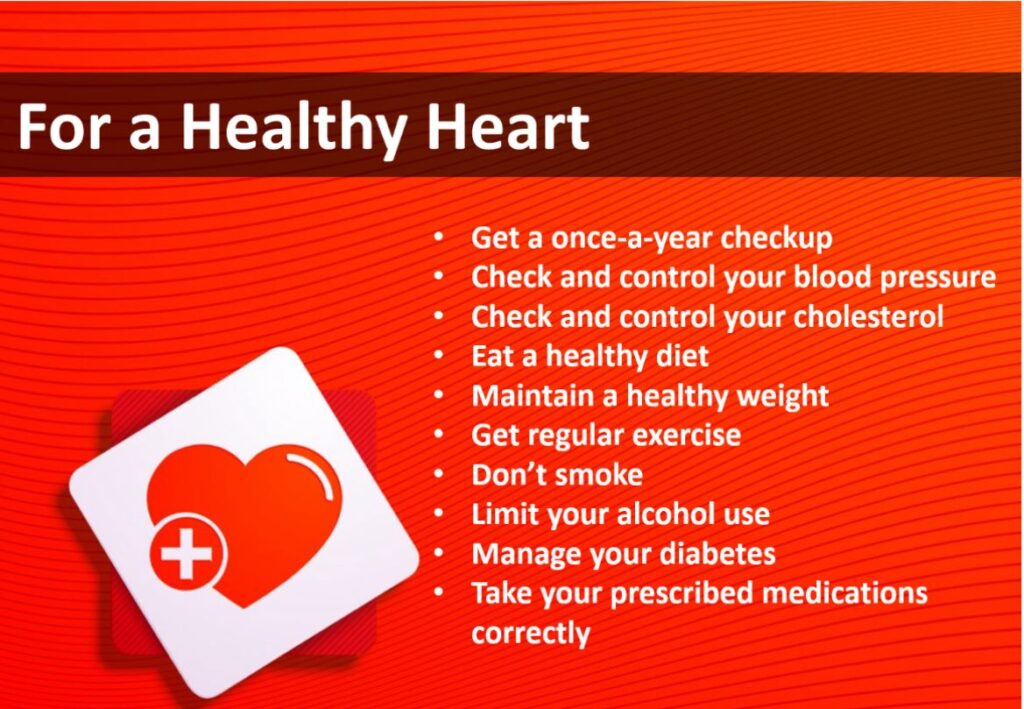By Sunkanmi Adewunmi
Heart disease is on the rise in Nigeria, but the good news is that many cases can be prevented with simple lifestyle changes. Cardiovascular disease (CVD) – which includes heart attacks and stroke – now causes about 31% of deaths globally and roughly 11% of deaths in Nigeria. Experts warn that many Nigerians don’t realize they are at risk until “catastrophes like stroke or heart attack” happen. The first step is understanding common risk factors – tobacco use, an unhealthy diet, lack of exercise, excess alcohol, and stress – that raise blood pressure, blood sugar, and weight, damaging heart health. The rest of this article offers easy, healthy heart tips and practical advice for Nigerians to follow right now.
Eat a Heart-Healthy Diet
What you eat has a big impact on your heart. Aim to fill your plate with fruits, vegetables, and whole grains every day. In Nigeria, local foods such as leafy greens (e.g., ewedu, ugu, okra), garden eggs, pumpkin, and ripe plantains are rich in fiber and nutrients. Choose whole grains, such as brown rice, millet, or oat-based meals, or unprocessed garri, instead of white rice or refined flour. Include lean proteins such as fish (rich in omega-3 fats), beans, peas, and chicken without skin. Eating nuts and seeds (like groundnut or ground melon) in moderation also provides healthy fats.
- Plenty of fruits and vegetables. Aim for at least 5 portions per day. Snack on pawpaw, mango, guava, or oranges, and add vegetables to soups and stews.
- Choose whole grains and fiber. Swap white rice for brown rice or millet, and try high-fiber staples like beans, lentils, and unripe plantain flour porridge (amala or ogi).
- Limit salt and oil. Too much salt (sodium) raises blood pressure. Use less salt when cooking (WHO recommends under 5 g per day) and flavor dishes with spices, onions, peppers, and herbs instead. Avoid deep-fried street foods (big rolls, deep-fried meat) or ask for less oil in soups. Replace red palm oil and saturated fats with healthier oils (in moderation).
- Cut down on sugar and processed foods. Limit sweet treats, sugary drinks, and processed snacks. These contribute to obesity and diabetes, which in turn hurt the heart.

Stay Active Every Day
Regular physical activity makes your heart stronger and helps control weight, blood pressure, and sugar. Aim for about 30 minutes of moderate exercise on most days (roughly 150 minutes per week). You don’t need a gym – simple activities count: walking, dancing, gardening, or cleaning can all make a difference.
- Take a brisk walk or jog. Walk to the market or park whenever you can. Use stairs instead of elevators.
- Make chores count. Gardening, washing cars, sweeping the compound – doing them energetically raises your heart rate.
- Join in games or dance. Play football, volleyball, or go cycling with friends. Traditional dances and exercises at home (belly dancing, doing zumba to Afrobeats, or even prayer movements) are fun ways to move.
- Stay active at work. If you sit a lot, stand up and stretch every hour. Park farther from the building or walk to a colleague’s desk instead of messaging.
Experts recommend regular exercise “to keep fit and lower [heart] chances”. Even a half-hour walk can improve blood pressure and fitness.
Avoid Tobacco and Limit Alcohol
Smoking and heavy drinking are major heart hazards. Cigarette smoke damages blood vessels and raises the risk of a heart attack. If you smoke, quitting is one of the best steps you can take – your risk begins to drop within weeks of quitting. Also, avoid second-hand smoke, which is harmful too. In Nigeria, some people chew tobacco or snuff; these also increase heart risk.
Excess alcohol can raise blood pressure and lead to heart failure. The safest choice is to drink little or no alcohol. If you do drink, keep it moderate (for example, no more than one drink per day for women and two for men). Avoid binge drinking or using alcohol to relieve stress. According to health experts, avoiding tobacco and alcohol together with a healthy diet and exercise, can “prevent CVDs”.
Manage Stress
Stress, anxiety, and anger can raise blood pressure and lead to unhealthy habits (like overeating, smoking, or drinking). Nigerians face many daily stressors – traffic, work pressures, money worries – but managing stress is important for heart health. Try these relaxation tips:
- Practice calm breathing or prayer. Spend a few minutes daily doing deep-breathing exercises or mindfulness. Many people find comfort in prayer or meditation.
- Get enough sleep. Aim for 7–8 hours of restful sleep each night. Good sleep helps regulate blood pressure and mood.
- Stay connected. Talk with family or friends when you’re worried. Share your troubles instead of keeping them bottled up. Laughter with loved ones is great medicine.
- Take breaks and have fun. Make time for hobbies: music, gardening, playing with children, or anything that relaxes you. Even short breaks during the workday (a walk or listening to music) can reduce stress.

Know Your Numbers: Get Regular Check-ups
Don’t wait for symptoms. Get your blood pressure, blood sugar, and cholesterol checked at least once a year (more often if you have risk factors). High blood pressure and high cholesterol often have no warning signs, but they severely damage the heart over time. In Nigeria today, only about half of the people with hypertension even know they have it. Regular screening is key: you may find free BP checks at local clinics, pharmacies, or community health events.
- Blood pressure: A normal reading is around 120/80. If your BP is high, lifestyle changes and medications (if needed) can control it. Many Nigerians benefit from an annual BP check.
- Blood sugar: If you’re overweight or have a family history of diabetes, get tested. Uncontrolled diabetes is a strong heart risk.
- Cholesterol: If you can, ask for a cholesterol test. High LDL (bad) cholesterol leads to artery clots. Healthy diets and medicines can lower it.
- Weight: Keep an eye on your body weight and waist size. Maintaining a healthy weight eases the load on your heart.
Health authorities in Nigeria urge routine screening and early treatment of these risk factors. For example, the health minister recommends that Nigerians regularly monitor blood pressure, cholesterol, and glucose levels and follow up with care. If you have a known condition (hypertension, diabetes, etc.), work closely with your doctor and take medications as prescribed.
Take Action Now: Small Steps Add Up
Preventing heart disease is about small, daily choices. Eating more fruit and vegetables, cutting salt, and moving your body are simple changes that can have a big impact on your heart health. Talk to a healthcare worker, join a community exercise group, or involve your family in healthy cooking. Even quitting one cigarette or one sugary drink a day is progress.
Nigeria’s health ministry warns, many Nigerians only learn about CVD when it’s too late. Don’t wait. Start following these tips today and encourage your loved ones to do the same. Together, we can build healthy hearts and stronger communities.








